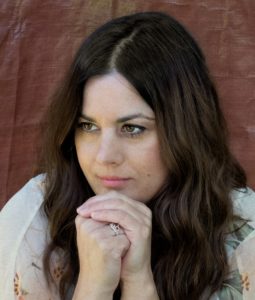Aretha is een heerlijk nummer van de Engelse singer/songwriter Rumer, waarin ze zingt over een klein meisje dat steun vind in de muziek van Aretha Franklin (1942-2018). Het lied komt van Rumer’s debuutalbum Seasons Of My Soul uit 2010.
Ze zegt er zelf het volgende over: “It’s a very soulful ballad about a little girl who goes to school listening to Aretha Franklin on her headphones. She’s having trouble at school and her mother’s suffering from mental illness and she hasn’t got anyone to talk to, but Aretha Franklin comes to life and encourages her and speaks to her through her imagination. Aretha is the Queen of Soul! If you’re going to write about somebody who embodies the spirit of music itself you go to the top of the list – and there she is! Her voice is probably the closest you get to God. There’s an incredible amount of passion and heartbreak in her voice as she’s lost a lot of family members. She’s just got something in her voice that puts her at the top of the tree and there’s no negotiation.”
 In het lied Aretha zitten veel elementen die over Rumer zelf gaan. Ze luisterde naar Aretha Franklin als ze naar school liep. Ze had een moeder met psychische problemen waardoor ze soms vergat om haar dochter op te halen van school. En ze voelde zich anders dan de andere kinderen op school en ook anders dan haar broers & zussen.
In het lied Aretha zitten veel elementen die over Rumer zelf gaan. Ze luisterde naar Aretha Franklin als ze naar school liep. Ze had een moeder met psychische problemen waardoor ze soms vergat om haar dochter op te halen van school. En ze voelde zich anders dan de andere kinderen op school en ook anders dan haar broers & zussen.
Rumer, wiens echte naam Sarah Joyce is, was de 7e van 8 kinderen en werd geboren in Pakistan, waar haar Engelse vader werkte als hoofd ingenieur van het Tarbela Dam Project, dat gefinancierd werd door de Wereldbank. De familie woonde daar van 1977 tot 1984. Naast de psychische problemen van haar moeder hadden twee bijzondere zaken uit haar jeugd grote impact op haar. Ten eerste was dat de scheiding van haar ouders toen ze in Engeland waren teruggekeerd. Rumer was toen 11 jaar oud en haar oudste zuster Cathy ging bij haar vader wonen, terwijl zij al die jaren haar steun en toeverlaat was geweest, om het gebrek aan zorg vanwege de problemen van moeder op te vangen.
 Maar nog belangrijker was dat in datzelfde jaar haar moeder plotklaps vertelde dat de Pakistaanse kok van de familie haar biologische vader was. Die had met haar moeder een affaire gehad. Dat verklaarde dat ze donker haar & donkere ogen had, terwijl haar broers & zussen blond haar & blauwe ogen hadden. ”It pretty much took over my life you know, this desire to have blonde hair and blue eyes. I was obsessed. In Pakistan there was no problem because other Pakistani kids were running around and no one paid any attention to you but as soon as you go in to mainstream school (in England) you notice it, you notice a difference. And of course my brothers and sisters were like Norwegians in colour, white blonde hair and blue eyes.” Ze wilde zijn zoals iedereen. ”I remember having a total episode of crying and screaming and howling and my mum saying, ‘When I was a little girl I wanted brown hair and brown eyes’, and I said no you didn’t, that’s such bullshit. Once I came home from school, took my uniform off, threw it in the corner and said I smell like a Paki. That’s what I was told. It was horrible.”
Maar nog belangrijker was dat in datzelfde jaar haar moeder plotklaps vertelde dat de Pakistaanse kok van de familie haar biologische vader was. Die had met haar moeder een affaire gehad. Dat verklaarde dat ze donker haar & donkere ogen had, terwijl haar broers & zussen blond haar & blauwe ogen hadden. ”It pretty much took over my life you know, this desire to have blonde hair and blue eyes. I was obsessed. In Pakistan there was no problem because other Pakistani kids were running around and no one paid any attention to you but as soon as you go in to mainstream school (in England) you notice it, you notice a difference. And of course my brothers and sisters were like Norwegians in colour, white blonde hair and blue eyes.” Ze wilde zijn zoals iedereen. ”I remember having a total episode of crying and screaming and howling and my mum saying, ‘When I was a little girl I wanted brown hair and brown eyes’, and I said no you didn’t, that’s such bullshit. Once I came home from school, took my uniform off, threw it in the corner and said I smell like a Paki. That’s what I was told. It was horrible.”
Nadat haar moeder in een impuls had verteld dat Rumer een andere vader had, zweeg ze er verder over, waardoor haar dochter zich er voor schaamde, en het pas drie jaar later aan haar broers & zusters durfde te vertellen. Voor haar was het duideljk: “The world was not a safe place to live in, that adults were not to be trusted. I became a control freak.”
Toen haar moeder in 2002 op sterven lag als gevolg van borstkanker, vroeg ze aan Rumer om de reis naar Pakistan te maken om haar echte vader te gaan zoeken. “I want to leave this planet with my house in order.” Na een barre reis kwam Rumer aan in een bergdorp in Pakistan en vond ze daar een hotel. “So, once I’m there, I order a cup of tea. The waiter comes over and I show him a photograph. He takes it off me and says: “That’s my father. He died three months ago.”
Al dat heftigs in haar leven heeft bij Rumer duidelijk sporen nagelaten, want later bleek dat niet alleen haar moeder psychische problemen had, maar dat ze zelf lijdt aan ADHD, Post Traumatisch Stress Stoornis (PTSS) en bovendien een bipolaire stoornis met manische periodes. Bijzonder dat ze toch in staat is bijzondere muziek te maken, waarvan wij als luisteraar mogen genieten.
Aretha
I got Aretha in the morning.
High on my headphones
and walking to school.
I got the blues in springtime
‘cause I know that I’ll never
have the right shoes.
Momma she’d notice
but she’s always crying.
I got no one to confide in,
Aretha nobody but you.
Than Momma she’d notice
but she’s always fighting.
Something in her mind
and it sounds like breaking glass.
I got Aretha in the morning.
High on my headphones
and walking to school.
I got the blues in springtime
‘cause I know that I’ll never
have the right shoes.
But you got the words,
baby you got the words.
You got the words,
baby you got the words.
Oh Aretha, Aretha,
I don’t want to go to school.
‘Cause they just don’t understand me,
and I think the place is cruel.
Child, singer, raise your voice.
Stand up on your own,
go out there and strike out.
I tell Aretha in the morning,
high on my headphones
and walking to school.
I got the blues in springtime
‘cause I know that I’ll never
have the right shoes.
But I got the words.

